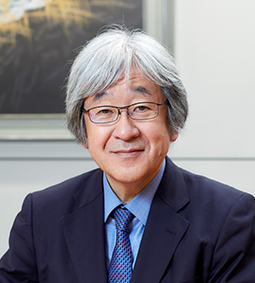PROFILE

HATTORI Nobutaka, M.D., Ph.D.
Department of Neurodegenerative and Demented Disorders
Short Biography
- 1985-1986
- M.D. Juntendo University Faculty of Medicine
Intern, Juntendo University Hospital
- 1986-1988
- Resident in Neurology, Department of Neurology, Fuji, National Hospital
- 1988-1989
- Assistant Professor of Neurology, Juntendo University
- 1990-1994
- Ph.D. Juntendo University Graduate School of Medicine
- 1990-1993
- Study Molecular Biology as a Special Graduate Student at Department of Biological Chemistry at the Faculty of Medicine, University of Nagoya
- 1994-1995
- Medical Staff, Department of Neurology, Tokyo Metropolitan Ebara Hospital
- 1995-1998
- Assistant Professor, Department of Neurology, Juntendo University
- 1999-2003
- Lecturer, Department of Neurology, Juntendo University
- 2003-2006
- Associate Professor, Department of Neurology, Juntendo University
- 2006-Present
- Professor and Chairman, Department of Neurology, Juntendo University Faculty of Medicine
- 2019-Present
- Dean, Juntendo University Faculty of Medicine
Keywords
- Parkinson's Disease
- Dementia
- Telemedicine
- Device monitoring system
- Neuroinflammation
Main Research Topics and Interests
- Parkinson's disease
- Device monitoring systems for neurodegenerative disorders
- Disease modifying therapy
- Diet leads to prevent neurodegenerative disorders
Publications (in English)
- Original and Review Articles (792)
- Books (16)
- Total Impact Factor (3,830.664)
- Citation Index (31,512)
- h-index (77)
Recent Main Publications
- Nakamura T, Sekimoto S, Oyama G, Shimo Y, Hattori N, Kajimoto H. Pilot feasibility study of a semi-automated three-dimensional scoring system for cervical dystonia. PLoS One. 2019 Aug 8;14(8):e0219758.
- Oji Y, Hatano T, Ueno SI, Funayama M, Ishikawa KI, Okuzumi A, Noda S, Sato S, Satake W, Toda T, Li Y, Hino-Takai T, Kakuta S, Tsunemi T, Yoshino H, Nishioka K, Hattori T, Mizutani Y, Mutoh T, Yokochi F, Ichinose Y, Koh K, Shindo K, Takiyama Y, Hamaguchi T, Yamada M, Farrer MJ, Uchiyama Y, Akamatsu W, Wu YR, Matsuda J, Hattori N. Variants in saposin D domain of prosaposin gene linked to Parkinson's disease. 2020 Apr 1;143(4):1190-1205. doi: 10.1093/brain/awaa064.
- Ueno SI, Hatano T, Okuzumi A, Saiki S, Oji Y, Mori A, Koinuma T, Fujimaki M, Takeshige-Amano H, Kondo A, Yoshikawa N, Nojiri T, Kurano M, Yasukawa K, Yatomi Y, Ikeda H, Hattori N. Nonmercaptalbumin as an oxidative stress marker in Parkinson's and PARK2 disease. Ann Clin Transl Neurol. 2020;7(3):307-317 14. doi: 10.1002/acn3.50990.
- Mori A, Hatano T, Inoshita T, Shiba-Fukushima K, Koinuma T, Meng H, Kubo SI, Spratt S, Cui C, Yamashita C, Miki Y, Yamamoto K, Hirabayashi T, Murakami M, Takahashi Y, Shindou H, Nonaka T, Hasegawa M, Okuzumi A, Imai Y, Hattori N. Parkinson's disease-associated iPLA2-VIA/PLA2G6 regulates neuronal functions and α-synuclein stability through membrane remodeling. Proc Natl Acad Sci U S A. 2019 Oct 8;116(41):20689-20699. doi: 10.1073/pnas.1902958116.
- Sekimoto S, Oyama G, Hatano T, Sasaki F, Nakamura R, Jo T, Shimo Y, Hattori N. A Randomized Crossover Pilot Study of Telemedicine Delivered via iPads in Parkinson’s Disease. Parkinson’s Disease 2019, ID 9403295, https://doi.org/10.1155/2019/9403295.
- More
Other Specific Comments
- Lifestyle may be associated with disease development. In this department, we will develop the best lifestyle of the prevention of disease progression in patients with dementia and neurodegenerative disorders.
- The Commendation for Science and Technology by the Minister of Education, Culture, Sports, Science and Technology, Research Category, May 30, 2014
Link

